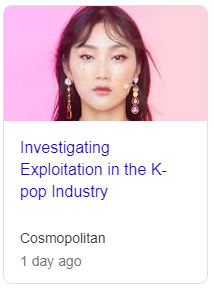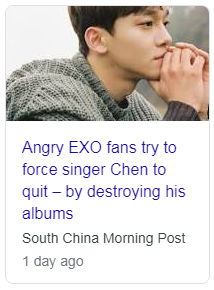Inside Scoop: Profile of a K-Pop Fangirl
- Natasha Lalonde

- Mar 11, 2020
- 4 min read
Updated: Apr 7, 2020
The Dark Side of Korean Stardom
Maya Scott-Lourenço grew up in Montreal’s South shore and has been a huge fan of K-pop for nearly a decade. Her love for Korean culture and music started when she was about thirteen years old and really shaped her appreciation for Eastern sound and underground styles of music. While she has a deep appreciation for the ways in which Korean culture differs from her own, she recognizes that it is important to be critical of even the things you love.
She sees K-pop’s recent surge in popularity as being caused by two things: the recent push for Asian representation in the media and the industry’s reliance on mass manufacturing idols who are perfect singers, dancers and performers. Maya says that the K-pop industry can indeed be a bit “backwards” but that it’s our responsibility to be conscious of the media we take in. She says, “If you just blindly consume the media and think of Korea as this haven of beautiful people who sing and dance, you’re just being intellectually lazy.”
In this profile, Maya delves deep into the worldwide sensation of K-pop and exposes some of its darker issues to reveal problematic aspects about media, Korean society and consumer culture in general. K-pop is more than just air-brushed beauties who seem to have it all, and Maya is here to spill the tea.
For readers who aren’t aware, would you mind explaining what exactly K-pop is?
At its core, K-pop is just Korean pop music. It just differs from American pop music in its culture of having mass-manufactured, produced groups. Teens who have a little bit of talent for singing, dancing - or who are just pretty people - can get scouted or apply to companies to become K-pop idols. They go through training to learn to sing, dance, speak, and act, and are then placed in a group. Basically, K-pop is about creating the perfect pop artists.
K-pop idols are known for being perfect. What ideals do you think tie into this?
I think Korean pop culture has always been a bit toxic because it’s based on people who are shaped to be in the public eye. As a country, Korea is very strict about appearance, and I think this bleeds into K-pop. Visuals are very important, so much that a lot of people find it damaging.
Being a K-pop star is a dream that many Korean kids have. They want to be looked up to. The issue is that kids buy into that dream and fight for it regardless of the circumstances they may find themselves in. From the beginning, your company puts them through grueling training. They see idols as an investment that they own and they don't get paid until they reimburse everything. This can sometimes take years. On that same note, Korean work culture, in general, is very problematic. Most adults also have 12-hour work days, so there’s little to no recognition that it's an unhealthy work environment for these young teenagers.
What do you think of the huge focus on scandal in K-pop?
Scandals are a huge part of K-pop, and this can be really damaging for the artists. Their personal lives, namely their dating lives, are subject to public scrutiny and it creates a very toxic existence for these stars. Fans become obsessed and focus on things that don't matter. There were two really publicised cases that actually expose larger issues and show how backwards K-pop culture can be: the suicides of SHINEE’s Jonghyun and F(X)’s Sulli. Honestly, I think that the suicides are the bigger scandal and what people should actually be focusing on. Historically, Korea has had the highest rate of young adult suicide, likely because of the pressures of schools and unrealistic beauty expectations. But these realities and taboos go hand in hand with K-pop.
Can you talk a bit about Jonghyun and Sulli’s stories?
Before his death, Jonghyun talked a lot about how difficult it was being in the industry and how he felt he couldn’t be himself.There were some implications that Jonghyun wasn’t heterosexual, which made it really hard to be a popular Korean artist. In interviews, it’s common to ask really intrusive questions about sexuality and attraction and, essentially, he had to live a lie. All his fans loved and supported him, but they didn’t really know him. There are some artists who are out, but it is still taboo to be gay in Korea.
Sulli’s scandal began when she posted an Instagram photo without a bra. You could see her nipples and people were outraged. They even called her a slut. She received a lot of targeted cyber bullying and death threats and it escalated until everything she did was in the eyes of the media.
There are things that are more important than scandals; people should be talking about mental health in Korea. They don’t have that same concern as we are starting to have in most western societies. Maybe it’s not my place to say they need to "improve" their society, but I think that regardless of culture, mental health should be a concern.
How do you reconcile your feelings about the genre with the controversies that have arisen out of it?
More and more when I recognize problems, it becomes harder to support the industry. It's just important to be aware of the issues and conscious of the media we're consuming. I think we can appreciate art without getting involved in the artist’s political views. Art can be separate from the artist and that's okay! There’s ambiguity and subjectivity in everything. It's important not to buy into the manufactured aspect or the toxic mentalities. We must be respectful of Korean culture, but also not be afraid to critique it in how it differs from our own mindsets and values. If you just blindly consume the media and think of Korea as this haven of beautiful people who sing and dance, you’re just being intellectually lazy.
So CULTURVERSERS, do we have any K-pop fans out there? K-pop haters?
Let us know in the comments below.















Comments